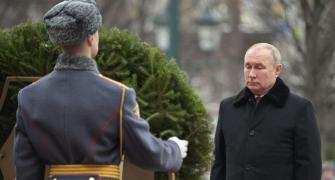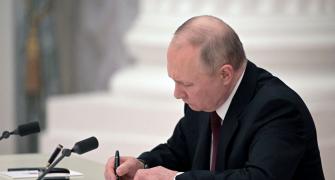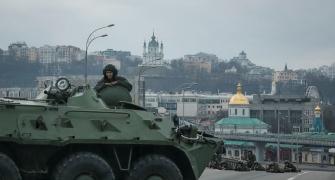Notwithstanding how the current impasse is solved, at some point in the future, Russia will realise that just as centuries ago it developed the paradigm of securing its heartland's safety through annexing vast buffer zones between itself and the enemy, a more modern security is possible only through friendly relations and sustainable peace, observes Shyam G Menon.

Russia's 'invasion of Ukraine' has unfolded like a puzzle progressively gaining clarity.
In a situation evolving by the week, February 15 brought the first sigh of relief for all as Russia announced that some of its troops amassed along Ukraine's border would be returning to their bases.
It made those who accepted the mobilisation as a military exercise, happy.
Those viewing the Russia-Ukraine stand off as betraying Russia's insecurity and a real invasion as never one with publicity build-up and dates disclosed in advance, remained unimpressed.
A week later, the situation appeared worsened with Russia recognising two breakaway regions in eastern Ukraine, reports of the Russian army gearing up to repeat a Crimea in these places and Ukraine stating it won't cede territory.
Fear of war returned and the US and its allies moved to impose sanctions.
On February 23, the media reported UN Secretary-General Antonio Guterres saying that the world was facing its biggest global peace and security crisis in recent years.
Things were back to square one.
Big and insecure
As yet, aside from Ukraine threatened, the cost of Russian adamance has been monetary.
Stock markets globally have been nervous, investors bled as indices crashed and energy prices and gold prices have risen.
Meanwhile the stand-off has the world divided into two camps.
There are those in awe of Putin for showing the guts to stand up to the West and there are those concerned about what aggression by a combination of the world's second most powerful military, the shrewd, charismatic and authoritarian leader at its top and adequate energy resources (plus gains accruing from higher energy prices) to drag on the aggressive military posturing, means.
In particular, what this example set by Russia holds as template at large, for the future.
As Putin becomes the macho dividing line deciding how we perceive the crisis, Ukraine has been relegated to mere proving ground for a game of strategy gauging how far our post-Hiroshima world may be pushed.
It is one in which Ukraine itself counts for little; it is the North Atlantic Treaty Organization (NATO) versus Russia, Putin versus Biden, new power blocs versus old ones and generals, diplomats and strategists clapping at pet theories vindicated.
What should interest the world is Russia's pursuit of guarantees from the West that no erstwhile Soviet bloc country would join NATO.
This refusal to recogniSe the power of choice other sovereign nations have and the continued demand for a buffer zone between the Russian heartland and the West only highlights the mysterious fear haunting a country straddling 11 per cent of the world's land area and is home to 145 million people and their military, among the world's strongest.
Not to mention Vladimir Putin, who is currently only the second longest serving leader in Europe after Alexander Lukashenko of Belarus; the latter, happy to host Russian forces on its terrain bordering Ukraine.

A bad example
Articles in the media have pointed out assurances given to Russia in the wake of the Soviet Union's collapse that NATO won't advance its outposts.
Russia's anger at such promises violated through NATO adding more members and the West's indulgence of Ukraine, loses legitimacy when viewed against the backdrop of an independent nation blatantly threatened.
An estimated 130,000 Russian soldiers were amassed at the border of Ukraine, a country which gave up its nuclear weapons and has much less military might than Russia.
Are there problems between the two countries? Yes, there are.
That is what the fighting in Ukraine's east is all about.
Many borderlands are so, especially ones with overlapping ethnicities.
But is there fighting in every such borderland worldwide? No.
Putin has described eastern Ukraine as 'ancient Russian lands'.
There is no shortage of Donetsk and Luhansk-like situations/claims in the world.
That Russia will fight militarily for such causes despite the world urging for restraint, actually opens a Pandora's Box on how similar issues elsewhere may be dealt with by the countries concerned.
In fact, a little explored angle amid incidents like Ukraine, tensions in Korea, the South China Sea, the Middle East and the Indian subcontinent is how the world's major militaries are clearing space for old school contests despite the deterrence promised by nuclear weapons.

The agreeable East
Everybody knew the moment Russian mobilisation commenced, the Russia-Ukraine stand-off would be a David versus Goliath scenario.
Would you fault the world for supporting David? Two aspects complicate the picture.
First, the US which anchors NATO is no angel itself.
While the erstwhile Soviet Union burnt its fingers in Afghanistan, the world is littered with the debris of post-Cold War American misadventures.
It is not the same country, which authored NATO in days of the West popularly identified with freedom, and the Communists with authoritarian regimes.
Currently there are authoritarian regimes in several countries, democracy is on fragile ground and the West has a track record of dealing with autocrats as long as there is business to be had.
In such a situation, even the US and its allies reduce to meriting checks and the only ones around capable of doing so are Russia and China.
It was therefore no surprise that Russia's moves on Ukraine were granted legitimacy in some quarters because at the end of the day, the stand-off with NATO balanced the distribution of power in the world.
Russia is an old friend of India. The Indian view of the Ukraine crisis gets coloured by this.
It denies proper perspective in a world of charismatic leaders of doubtful intent, pragmatic relationships between countries and multiple flash points for strategists to play like an orchestra.
China is an ally of Russia. The Chinese arms manufacturing complex owes much to Russia. The two countries also wield influence over North Korea, famous for rattling America and its Asian allies.
Having amassed his army at Ukraine's border and put the West on notice, Putin went to Beijing to talk Ukraine and new energy projects with China over the Winter Olympics.
This, when China had just ruffled Indian feathers by including a military officer from the Galwan Valley stand-off, in its torch relay.
Having initially played down fears of a conflict in Ukraine, India was by then announcing special flights to evacuate its citizens and advocating peace.
Coupled with the country abstaining at the UN Security Council's vote on Ukraine, India has been a silent spectator on the issue.
Not much different from China, whose deafening silence has been questioned by the West.
The world celebrates the Asian century without asking enough what type of political leadership Asia likes.
Looking east from Moscow, Putin may have noticed more of his ilk.

Leader and State as one
This is where the second of the earlier said two aspects, kicks in.
Russia is a lot like China and -- spoken so -- even like what India under charismatic leaders would perhaps like to be.
Throughout the Ukraine crisis of 2021-2022, Russia and Putin have been presented as interchangeable entities as if one is the other.
It is the same problem, the world has with China, where the country and the centrality of the Communist party -- including Xi Jinping therein -- appear bound together.
As those who have studied such political structures would tell us, often times this identification of leader or party as the state, is their licence to survive.
It keeps their intent seemingly nationalist and beyond question.
Consequently, in both Russia and China, one wonders: What do the people actually want?
How do the Russian people view their predicament living as they do in this unique matrix of sprawling, resource-rich land, comparatively modest population and the world's second most powerful military?
Do they see Ukraine as a threat?
Ukraine with a nominal GDP of 204 billion dollars, an area of 603,628 square kilometres and no nuclear warheads and Russia with a nominal GDP of 1.7 trillion dollars, area of 17,125,191 square kilometres and an estimated 6400 nuclear warheads (more than half the world's total).
Authors like Robert Kaplan and Tim Marshall have highlighted the role of geography in shaping regional and national character.
Marshall in his book, Prisoners of Geography mentions Russia's longstanding fear of attack from the West, mainly via the north European plain; its post-Soviet avatar being Russia's suspicion of NATO. He also cites the criticality of Sevastopol for the Russian navy's blue water ambitions.
Notwithstanding how the current impasse is solved, at some point in the future, Russia will realise that just as centuries ago it developed the paradigm of securing its heartland's safety through annexing vast buffer zones between itself and the enemy, a more modern security is possible only through friendly relations and sustainable peace.
Buffer zones cannot be seen anymore as just patches on a map.
They are the homes of others; others entitled to their own mind.
Shyam G Menon is a Mumbai-based columnist.
Feature Presentation: Aslam Hunani/Rediff.com









